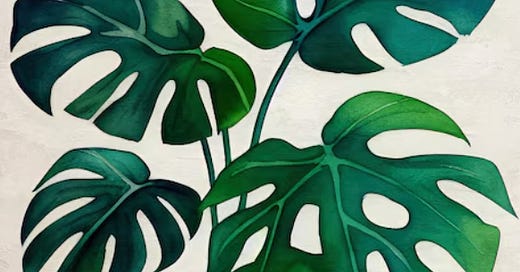Growth vs Progress
This week, I donated and recycled a whole stacks of books and book proofs I am never going to read or re-read, and I cut back the huge monstera I have in my living room. I love my monstera and I love my books. I am unrestrained in my book-buying, and since for the first time comprehending that the plants you water do actually sometimes grow, my monstera has not only grown but grown out of control.
Growth, whether economic or emotional, is deified in the 21st century. We live in a society that contorts itself according to the logic of optimised accumulation (of things, power, money, knowledge) and the intense satisfaction of acquisition. Undeniably, it feels good to grow, to accumulate, to acquire. “Growth” is both an individual aim (you are going to therapy, you are working on your relationships, your looks, your career) and an index of prosperity for people, enterprises, entire economies.
Growth, through, is a crude measure. Economist Thomas Piketty points out that many conventional measures of economic prosperity (GDP for example) obscure the profound variations and, crucially, inequalities present within single economies that might, according to the gross measures, have all the appearance of healthy and consistent growth. His analysis goes a long way to explaining why the living conditions in a country so seemingly prosperous as, for example, the United States vary so dramatically: from abjection, indebtedness and homelessness to untrammelled accumulation. The impulse towards growth at any cost takes many casualties, and, within such dynamics, it is the unchecked growth of inequality and insecurity and not the growth of wealth that shapes the lives of a rapidly increasing majority.
It’s easy to forget, when the imperative to grow is also a condition of survival, but growth is not always a good thing. Weeds, for example, grow. Mould grows. Plenty of diseases do their damage via the exponential proliferation of cells. My monstera, obscuring the screen of my television and spilling half its branches into my armchair, has certainly grown. And now that I’ve taken my scissors to it, trimmed dead leaves and dead stalks, restrung the remaining plant more carefully to its stake, the plant is healthier. It is greener, more contained, its leaves perkier and more easily exposed to sunlight.
So what if growth is not the aim? What, instead, of progress?
I’ve written plenty about growth in this newsletter before, and how it is so important to remember what needs to be shed before growth can take place. Certainly, trimming both my monstera and my book collection, I am parting with the old and making way for the new. But it’s not just about the method or the means but also the intention.
Progress as opposed to growth is concerned with direction as opposed to magnitude. Progress is about movement rather than an acquisition, about distance travelled rather than dimension. And progress, most importantly, is about my relationship with and orientation to the things that I admire or desire or need, rather than my domination and acquisition of those things. It’s about how my monstera sits in relation to the space I have made for it, rather than how big it is.
It’s a small but significant distinction, one I’m thinking about plenty in relation to my own progress, as well as other, far larger dreams. It’s one worth trying: replacing the word “growth” with the word “progress”, and seeing what happens to the thoughts and the actions that follow.
Love, Rosie xxx



